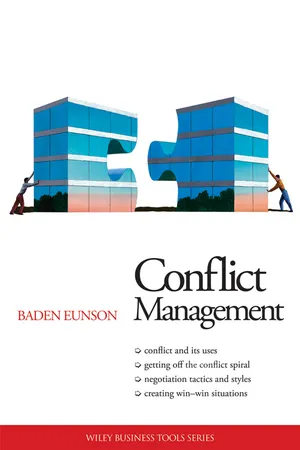Conflict Management
About this book
Conflict Management is an easy-to-read and high-powered tool for understanding and managing conflict situations. Conflict can spiral out of control, but if you understand how the spiral works you may be able to prevent it from even beginning.
In this book you will find many options for managing conflict, including:
- planning
- goal setting
- compromise
- mediation
Expert communicator Baden Eunson also takes an in-depth look at negotiation skills. He offers a visual and fresh approach to the work of strategies and tactics, negotiation styles, the importance of listening and questioning skills, the reasons why the location of negotiation can affect its outcome, and why the phrase 'win-win' is not a cliché but a technique for success.
Tools to learn more effectively

Saving Books

Keyword Search

Annotating Text

Listen to it instead
Information
Is Conflict Always a Bad Thing?
- negative emotions
- blocked communication
- increased negative stereotyping of those we are in conflict with
- reduced coordination between people who have to work and live together
- a shift towards autocratic leadership when discussion-based decision making breaks down
- reduced ability to view other perspectives and a breakdown in empathy and vision.
- Pressures and frustrations are released. When unexpressed conflicts are finally expressed, combatants sometimes experience a sense of relief, and can calm down and consider the situation with less heat and more light — for example, ‘I was just letting off steam’, ‘At least I got it out of my system’.
- New perspectives and information can be gathered about the other side. Combatants can become aware of each other’s point of view, and may see some merit in the opposing views. Empathy increases, and better decisions can be made.
- New perspectives can be gained about our side. We may not even be aware of our own views until a conflict situation forces the expression of those views. Also, we may become aware of weaknesses and inconsistencies in our own views. Conflict energises us to do and think new things.
- Better decision making and problem solving can take place. New information and perspectives are created as a result of the conflict. These allow us to see things more clearly and take appropriate action.
- Cohesiveness can increase. Groups, teams, couples and organisations may find that members are closer after the stress of conflict (and the release that comes with a successful resolution of that conflict) than they were before — the bonds between them are stronger, not weaker.
- Complacency can be challenged. Lack of, or suppression of, conflict in some situations may mean that various unhealthy things are happening — there may be opposition to new ideas, as well as paralysing timidity and myopic denial of unresolved tensions. Conflict may challenge all of these.
- Change can take place. Conflict is often the engine of change. Charles Darwin argued that conflict between organisms produced the survival of the fittest, so that evolution was dependent on conflict. Karl Marx argued that human progress depended on conflicts between social classes. George Bernard Shaw put it another way: ‘The reasonable man adapts himself to the world: the unreasonable one persists in trying to adapt the world to himself. Therefore all progress depends on the unreasonable man.’
- Differences can be appreciated. If differences between partners in a conflict are not perceived to be insurmountable, then a new synthesis, a combination of the energies of differing people (synergy) can take place.
- Intrapersonal conflicts can be resolved. We can have conflicts within ourselves as well as conflicts with others. Sometimes engaging in and resolving conflicts with others can resolve inner conflicts.
Resolving and Managing Conflict
What Causes Conflict?
- Scarce resources. Two parties want the same thing — a coat in a shop, a window view, an inheritance, a parking space, access to a river, a broadcasting licence, land, the affections of a third person, political control of a na...
Table of contents
- Cover
- Title page
- Copyright page
- Preface
- Introduction
- Chapter 1 Conflict — the basics
- Chapter 2 Conflict development
- Chapter 3 Approaches to managing conflict
- Chapter 4 Negotiation — the basics
- Chapter 5 Positions, concessions and interests
- Chapter 6 Getting ready to negotiate
- Chapter 7 Negotiation styles
- Chapter 8 Negotiation tools and planning
- Conclusion
- Glossary
- Index
Frequently asked questions
- Essential is ideal for learners and professionals who enjoy exploring a wide range of subjects. Access the Essential Library with 800,000+ trusted titles and best-sellers across business, personal growth, and the humanities. Includes unlimited reading time and Standard Read Aloud voice.
- Complete: Perfect for advanced learners and researchers needing full, unrestricted access. Unlock 1.4M+ books across hundreds of subjects, including academic and specialized titles. The Complete Plan also includes advanced features like Premium Read Aloud and Research Assistant.
Please note we cannot support devices running on iOS 13 and Android 7 or earlier. Learn more about using the app
